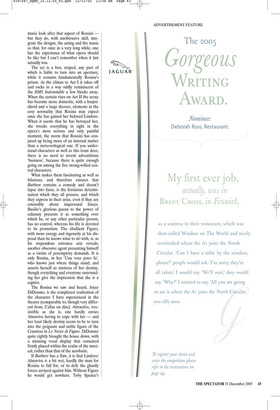Near perfection
Michael Tanner
Il barbiere di Siviglia
Covent Garden
The Royal Opera’s new production of Rossini’s supreme Il Barbiere di Siviglia affords one of the few evenings of near perfection that I have ever experienced in an opera house. The only imperfection of any kind was at the beginning, and presumably is unlikely to happen again: a surprisingly, even alarmingly ragged account of the Overture, though even there there was a great deal of delightful pointing of phrases and revelling in Rossini’s strange ear for orchestral sonorities. After that, with the raising of the curtain — for once not too early — everything had the immaculate precision without which, as the conductor Mark Elder insists, Rossini comes to nothing. And the production, by the familiar team of Moshe Leiser and Patrice Caurier, with sets by Christian Fenouillat, exactly but originally brings out the essence of a piece which it is tempting to let look after itself, or fuss with endlessly.
I have found Leiser and Caurier sometimes rather indolent in the past, with their under-directed Butterfly, and even, to my mind, their routine Cenerentola and Turco in Italia. In Barbiere they don’t lapse, contrariwise, into hyperactivity — they let the music look after that aspect of Rossini but they do, with unobtrusive skill, integrate the designs, the acting and the music so that, for once in a very long while, one has the experience of what opera should be like but I can’t remember when it last actually was.
The set is a box, striped, any part of which is liable to turn into an aperture; while it remains fundamentally Rosina’s prison. At the climax to Act I it takes off and rocks in a way oddly reminiscent of the HMS Indomitable a few blocks away. When the curtain rises on Act II the scene has become more domestic, with a harpsichord and a large dresser, elements in the cosy normality that Rosina may expect once she has gained her beloved Lindoro. When it seems that he has betrayed her, she wrecks everything in sight in the opera’s most serious and only painful moment, the storm that Rossini has conjured up being more of an internal matter than a meteorological one. If you understand characters as well as this team does, there is no need to invent adventitious ‘business’, because there is quite enough going on among the five strong-willed central characters.
What makes them fascinating as well as hilarious, and therefore ensures that Barbiere remains a comedy and doesn’t lapse into farce, is the ferocious determination which they all possess, and which they express in their arias, even if they are ostensibly about impersonal forces. Basilio’s glorious paean to the power of calumny presents it as something over which he, or any other particular person, has no control, whereas his life is devoted to its promotion. The ebullient Figaro, with more energy and ingenuity at his disposal than he knows what to do with, is, as his stupendous entrance aria reveals, another obsessive agent presenting himself as a victim of peremptory demands. It is only Rosina, in her ‘Una voce poco fa’, who knows just where things stand, and asserts herself as mistress of her destiny, though everything and everyone surrounding her give the impression that she is a captive.
The Rosina we saw and heard, Joyce DiDonato, is the completest realisation of the character I have experienced in the theatre (comparable to, though very different from, Callas on disc). Attractive, irresistible as she is, one hardly envies Almaviva having to cope with her — and her least likely destiny seems to be to turn into the poignant and noble figure of the Countess in Le Nozze di Figaro. DiDonato quite rightly brought the house down, with a stunning vocal display that remained firmly placed within the realm of the musical, rather than that of the acrobatic.
If Barbiere has a flaw, it is that Lindoro/ Almaviva is a bit wet, hardly the man for Rosina to fall for, or to defy the ghastly forces arrayed against him. Without Figaro he would get nowhere. Toby Spence’s Count is winningly, not whiningly sung and acted, but it’s clear that George Petean’s Figaro is indispensable at every juncture. Petean gives a rich portrayal, entering from the back of the stalls, almost Mephistophelean in his suspect helpfulness. Bruno Pratico’s Bartolo is possibly stronger on wheezes, of mirth or distress, than on notes, but he has tremendous presence. And Raymond Aceto enacts a Basilio of quite fearful moral and psychological squalor, so that the usual half-eaten meals that adorn his front clothing aren’t required. All the characters are volcanic, but what he puts forth is evidently pus.
Making sure that this all-too-lifelike collection of monsters collaborate to perfect effect musically, so that their Hobbesian egomania can be wholly exposed, is Elder in his second extraordinarily brilliant appearance of the season. With his conducting of Donizettis’s Dom Sebastien he almost persuaded us we had been neglecting a masterpiece. With this Barbiere he establishes beyond doubt that we have been inertly resting in the pleasures of a work which he has cast quantities of new light on — it’s hard to imagine wanting to hear it performed under anyone else.



















































 Previous page
Previous page